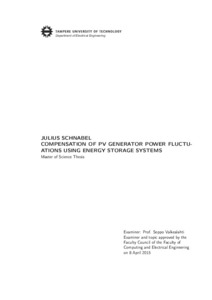Compensation of PV Generator Power Fluctuations Using Energy Storage Systems
Schnabel, Julius (2015)
Schnabel, Julius
2015
Sähkötekniikan koulutusohjelma
Tieto- ja sähkötekniikan tiedekunta - Faculty of Computing and Electrical Engineering
This publication is copyrighted. You may download, display and print it for Your own personal use. Commercial use is prohibited.
Hyväksymispäivämäärä
2015-09-09
Julkaisun pysyvä osoite on
https://urn.fi/URN:NBN:fi:tty-201508191525
https://urn.fi/URN:NBN:fi:tty-201508191525
Tiivistelmä
General awareness of global warming has increased interest towards renewable energy solutions. Photovoltaic solar power is one of the most notable renewable energy production methods and a continuously increasing industry. The power production behavior of photovoltaics, however, is rapidly and intensively fluctuating even on very short timescales. Feeding such fluctuating power into a power system can cause serious stability issues. More and more grid operators are demanding solar power producers to regulate the fluctuations to stay within strict ramp rate limits.
Energy storage systems have been recognized as a viable solution for compensating these fluctuations. This thesis delves into the behavior, control and sizing of these systems based on the requirements that the compensation application sets for them. The thesis depicts how solar power can be generally modelled with irradiance and temperature measurements. The model is utilized together with extensive measurement data to study virtual energy storage systems with solar power plants.
This thesis demonstrates how the capacity and power requirements of the energy storage are highly dependent on the control method of the system. Notable capacity savings can be made by utilizing state of charge control. The control, however, can cause production outages. Methods to reduce these outages are presented in this thesis in order to enable the use and benefits of state of charge control.
The results of this thesis show how the sizing of the storage depends greatly on the size of the plant and the required ramp rate limit. Very strict ramp rate limits require the storage capacity to be relatively high regardless of the plant size. The storage power requirement is inversely proportional to both the generator size and ramp rate limit. Power rating savings can also be made if complete ramp rate limit obedience is not necessary. The thesis also reveals how the fluctuation compensation induces an exponentially decreasing amount of stress to the storage as a function of the required compensation energy. The degradation resulting from the stress is shown to be minimal if an appropriate storage technology is utilized.
Energy storage systems have been recognized as a viable solution for compensating these fluctuations. This thesis delves into the behavior, control and sizing of these systems based on the requirements that the compensation application sets for them. The thesis depicts how solar power can be generally modelled with irradiance and temperature measurements. The model is utilized together with extensive measurement data to study virtual energy storage systems with solar power plants.
This thesis demonstrates how the capacity and power requirements of the energy storage are highly dependent on the control method of the system. Notable capacity savings can be made by utilizing state of charge control. The control, however, can cause production outages. Methods to reduce these outages are presented in this thesis in order to enable the use and benefits of state of charge control.
The results of this thesis show how the sizing of the storage depends greatly on the size of the plant and the required ramp rate limit. Very strict ramp rate limits require the storage capacity to be relatively high regardless of the plant size. The storage power requirement is inversely proportional to both the generator size and ramp rate limit. Power rating savings can also be made if complete ramp rate limit obedience is not necessary. The thesis also reveals how the fluctuation compensation induces an exponentially decreasing amount of stress to the storage as a function of the required compensation energy. The degradation resulting from the stress is shown to be minimal if an appropriate storage technology is utilized.
